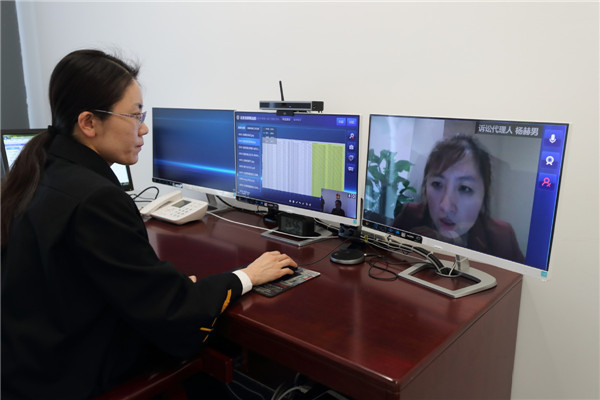Cybercourts ease judicial workloads, provide better rulings

Liu Shuhan, a judge in Beijing, deals with a case online at the internet court last month. WANG JING/CHINA DAILY
Workload eased
Zhao Changxin, another judge at Beijing's online court, said that in addition to providing greater convenience for litigants, the internet tribunals ease the burden on the judicial system.
Statistics provided by the Beijing High People's Court show that 37,631 internet-related disputes were filed in the capital from January to August last year, a rise of 24.4 percent from 2017.
Traditional methods, such as delivering hearing details or rulings via the postal service, cannot begin to match the internet's fast pace, let alone deal with the surge in the number of cases of this type, Zhao said.
Technologies, such as information-sharing platforms and voice-recognition systems, have been instrumental in improving judicial efficiency and providing effective solutions to the rise in internet-related cases, he added.
Liu echoed that opinion. "For example, the court clerks' workload has been eased, because the voice-recognition system in each courtroom helps them to record trials. Now, their job revolves around checking the records," she said.
When a trial is concluded, the plaintiffs and defendants receive an electronic verdict with a quick response code. "Scanning the code and signing their names online means the ruling has been accepted by both sides," Liu said, adding that the system has alleviated difficulties experienced under the old system.
"In the past, some defendants left unclear addresses, making it hard to find them and send them the rulings. But now, we can follow up online to make sure they have received and read the verdict."
Challenges, concerns
Despite the progress made, a few issues still need to be ironed out. Zhao pointed out that litigants still have to visit the court to collect a physical copy of a ruling if they want to use it as evidence or submit it as material in another lawsuit.
"That means it is essential for us to improve cooperation with other government departments to persuade them to approve the use of judicial information online, so internet rulings will have equal status to physical ones," he said.
For her part, Liu conceded that she is a little anxious about the 24-hour provision of legal services online. "I have to respond to litigants' questions at any time, including weekends and holidays," she said.
"The response system needs to be regulated. Judges can answer questions about the law, but court clerks or judicial assistants should deal with smaller issues."
Gao, the lawyer from Beijing, welcomed the greater judicial openness and efficiency provided by the internet courts, but said the rapid adoption of technologies and improper use of judicial data may also pose security risks.
According to Zhao, not all internet-related cases are suitable for online hearings. For example, it would be better to have face-to-face hearings in cases involving serious conflicts to prevent litigants from blocking the network or closing it down during online trials.
According to Ma, from Zhongnan University of Economics and Law, the most important thing is to balance the relationship between justice and technology.
"We must be prudent when extending cybercourts and online hearings across the country," he said. "After all, the key point about settling a dispute is always justice, not the internet."

 Judicial White Paper
Judicial White Paper
 Play
Play Play
Play Online Lawsuit Guide
Online Lawsuit Guide Beijing Internet Court Lawsuit Service WeChat Account
Beijing Internet Court Lawsuit Service WeChat Account  Beijing Internet Court WeChat Account
Beijing Internet Court WeChat Account